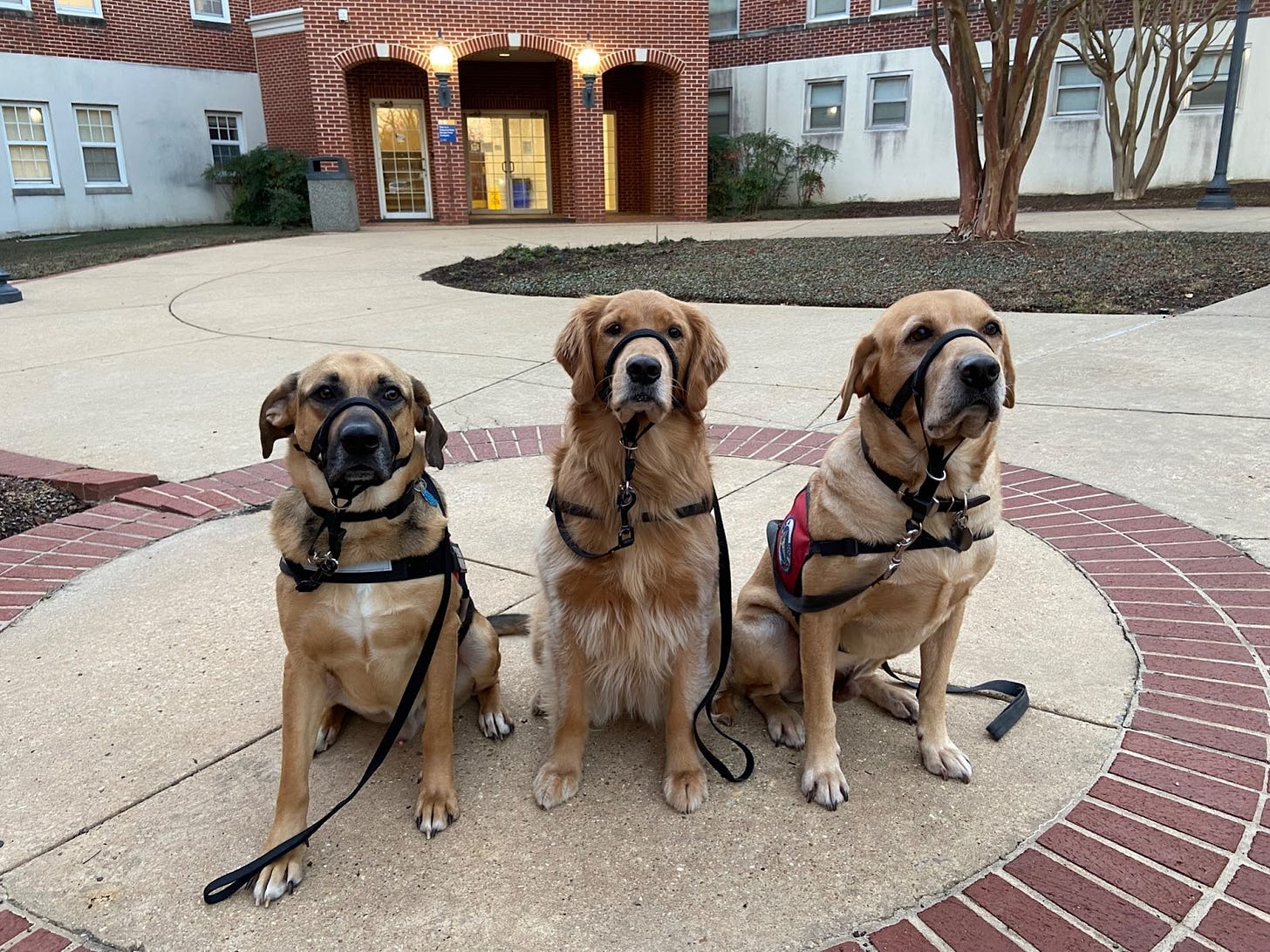Service Dog Community Grows at MC
"It was to the point where I couldn’t really be at school without help."
Many of us are familiar with the film Pretty Woman. In this rom-com, Vivian Ward, the star character and prostitute, walks into a high-end clothing store, wearing not-so-high-end clothing. The store clerk immediately refuses to help Vivian. The next day, Vivian returns wearing name-brand attire and is unrecognizable to the store clerk, who lives off of commission. The clerk offers to help Vivian, but she rejects the help and walks out of the store. Moral of the story: Don’t judge others based on appearance. Moms repeatedly remind their children to be nice to everyone and to not stare at people that look different. These are basic manners. Even on a college campus, where students come from all backgrounds and experiences, the same rules apply, especially when it comes to service dog handlers.
Many individuals never know that having a service dog is an option for them; Sam Glaze, a computer science major from Gulfport, Miss., used to be one of those individuals. Glaze is currently in the process of training his service dog Beans, a black mouth cur.
“[The option of having a service dog has] always been there, but no one really knew about it. I wouldn’t have had Beans if I hadn’t met [my friends here] because I wouldn’t even have known it was an option,” said Glaze.
MC is home to two fully trained service dogs and one service dog in training. While the natural inclination is to run to the dog, say hi, and pet him, these actions can be detrimental to the life of the handler. Thus, it is important to know how to treat service dogs.
A service dog is a dog specially trained to aid an individual in situations of high anxiety and in situations where medical attention is needed. Two types of service dogs exist— medical and psychiatric. A medical service dog helps those with physical illness like epilepsy and diabetes to complete daily, mundane tasks. On the other hand, psychiatric service dogs are wired more for the unseen disabilities such as mental illnesses and learning disabilities.
Retaining a service dog can be a tedious process; it varies from state to state. Some go through an agency, and some train their own dogs. The process consists of an initial application, interviews, home visits, meet-ups, and sometimes fundraising. In order to attend MC, service dog handlers must fill out an application and their case must be legitimized by MC faculty. Once on campus, service dog handlers must live in either East, West, or Quick because of the ventilation systems. However, other than having their dogs, service dog handlers live lives similar to other students on campus.
Rebecca Pyburn, a Christian studies major from Memphis, Tenn., has owned her golden retriever, Meadow, for six years. During her freshman year at MC, Pyburn suffered from Post-Traumatic Stress Disorder.
“I couldn’t go to the cafeteria or the Commons. I had panic attacks multiple times a week, sometimes multiple times a day. It was to the point where I couldn’t really be at school without help,” said Pyburn.
At the time, Meadow had been trained for four years by Pyburn to be a therapy dog. Meadow is now functioning as a psychiatric service dog.
Pyburn said, “There is so much joy in that I can function as a normal human being now … Only the Lord could have made everything work so perfectly to where I was training a dog already.”
Damon Purdy is a business administration major from St. Marys, Ga. He has had his medical service dog, Cooper, for five years. Cooper is trained in 42 different tasks.
Purdy said, “Specifically for me, it’s for Asperger’s as well as several other complications. At least for [Cooper], he is able to pick up on sensing pheromones that I give off when I am anxious, nervous, or uncomfortable in a situation and be able to end up comforting me in a multitude of ways.”
The main task service dogs are trained for is deep pressure. Deep pressure is the act of the dog laying his head (or his entire body in some circumstances) in the lap of his owner. Caroline Tate explained it as working the same way a weighted blanket works for a person with anxiety.
Tate, a math education major from Dallas, Texas, is close friends with Glaze, Purdy, and Pyburn. Tate has become an expert in service dog etiquette.
Tate was “blissfully unaware of service dog lingo” before meeting Pyburn, Purdy, and Glaze. As she spent more time around her friends, Tate has learned the ins and outs of service dogs and how individuals should treat service dogs. The number one rule, when it comes to approaching service dogs and their handlers, is to ignore the dog completely.
“The way I have explained it before is if you are a Harry Potter fan, pretend like they have the invisibility cloak over them,” said Tate.
Another thing to note is that the story behind someone’s service dog might be a touchy subject. It can surface difficult experiences in the life of a service dog handler.
Glaze said, “For us, [getting a service dog] wasn’t a light decision. It wasn’t a fun decision to make.”
For many people, it is not a choice. Service dogs are their only option to live life in a semi-normal fashion. Dogs are truly amazing creatures that God has created not only for man’s enjoyment but also to help man in daily living.
The service dog community on MC’s campus is expected to grow in the years to come, and it is vital for students to learn how to treat service dogs and handlers with respect and love.


